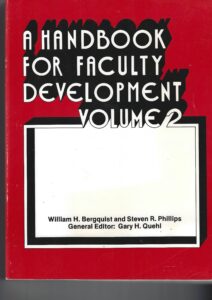
Authors: William Bergquist and Steven Phillips
The three volumes of A Handbook for Faculty Development are now legendary. They played a key role in guiding the early perspective on and practices of faculty development in American higher education during the 1970. Their impact is widely documented While two of these three volumes have been out of print for many years, the one most often cited and used (Volume Two) is still available in limited quantity. As the co-publishers of this volume, Pacific Sounding Press is pleased to be able to offer it once again for sale.
Purchase the book.
 The second volume contains many valuable resources that are still quite relevant and useful for those planning for providing faculty development services. In the first section of this volume, different models of faculty development are offered along with assumptions to be made about each model. This resource can still be engaged to elicit important discussions about the future directions for a faculty development initiative. The second chapter concerns faculty motivation and offers resources for assessing motivation, while the third chapter provides a guide for preparation of faculty portfolios.
The second volume contains many valuable resources that are still quite relevant and useful for those planning for providing faculty development services. In the first section of this volume, different models of faculty development are offered along with assumptions to be made about each model. This resource can still be engaged to elicit important discussions about the future directions for a faculty development initiative. The second chapter concerns faculty motivation and offers resources for assessing motivation, while the third chapter provides a guide for preparation of faculty portfolios.
The second section focuses on faculty evaluation and instructional improvement. The University of Massachusetts faculty evaluation process is highlighted and many valuable planning and design tools are provided. Both the evaluation and planning resources might be particularly valuable right now given the push toward education at a distance (on-line and digital). Faculty in many colleges and universities must take some instructional risks and do some major redesign of their courses.
In Section Three attention turns to personal and organization development as key components of any comprehensive faculty development program. Chapters focus and provide abundant resources in four areas: leadership, interpersonal skills, life planning and values clarification. The fourth section focuses on program development and evaluation–including tools for evaluation of faculty development programs. This section contains a brief, but unique and insight-filled approach to faculty development that engages the wisdom of community development practitioners throughout the world.
What does all of this add up to? This handbook offers many resources, many ideas and a comprehensive perspective on the critical field of faculty development. Given the major changes facing 21st Century colleges and universities, this book can provide academic leaders and faculty developers with valuable guidance and assistance.
A limited number of this volume of Handbook for Faculty Development is still available. Your copy will be signed by the first author.





